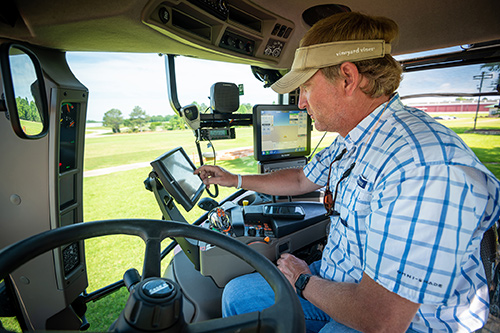11/11/2022 - Jackson, Miss.
Mississippi's future prosperity will be determined by how innovative we are today and how well we are able to build on existing technology and develop new technology. Mississippi Public Universities are leading the state's innovation and technology efforts through degree programs that produce graduates for high-demand fields, conducting research to solve some of our most pressing problems, and using technology to respond to the needs of Mississippians.
Mississippi Agricultural and Forestry Experiment Station (MAFES) scientists in the Division of Agriculture, Forestry, and Veterinary Medicine at Mississippi State University are using artificial intelligence to tackle some of today's toughest issues. Food safety and quality issues can affect the profitability and sustainability of Mississippi's top industry and America's most consumed meat. See how scientists are applying high-resolution imaging technology to poultry production for early detection in meat quality. MAFES researchers are testing new technology for more accurate planting across Mississippi and getting the answers to growers to improve their outcomes. Learn how MSU is a trusted partner in public and private research.
Innovation is fueled at Mississippi University for Women by reaching the state's youngest innovators, early childhood students. Through exposure to scientific processes like observation and experimentation, early learners develop the foundation for careers in STEM. Daily integrated art activities stir the imagination of future artists and designers. The curiosity, imagination and piqued interests of 2, 3, and 4-year-olds is the germinated seed of research, innovation and entrepreneurship in the state. Through innovative partnerships, MUW supports regional citizens through a lifelong learning model following students from birth through post graduate enrichment.
Mississippi Valley State University has partnered with The Black Collegiate Gaming Association to assemble a gaming laboratory on campus for students to learn the preliminaries of gaming. In addition, the lab gives students insight into the gaming industry and career choices and builds team and leadership skills.
Mississippi Valley State University's Department of Engineering Technology offers five (5) concentrations and prepares students to become management-oriented technical professionals with a concentration in Architectural Construction Management, Computer-Aided-Drafting and Design (CADD), Electronics Technology, Technology Management, and Automated Identification Technology (AIT). The department provides selected instructional programs for the preparation of people for careers in specialized fields in technology. It aims to contribute to the professional growth of students in their careers and the elevation of technical discipline through public services; and to intensify and broaden the base of knowledge of student development through humanistic and intellectual components as well as socialization along with occupational preparation.
The University of Mississippi is recognized as an Innovation and Economic Prosperity University, a designation by the Association of Public and Land-grant Universities that recognizes the university's strong commitment to economic engagement and its work with public and private sector partners in Mississippi and the region.
The University of Mississippi's Haley Barbour Center for Manufacturing Excellence offers academic and hands-on courses that teach accountancy, engineering, business, communications and continuous improvement through the lens of manufacturing. CME's LEED-certified facility includes a 12,000-square-foot manufacturing floor where students learn the importance of safety in the industrial environment, the value of teamwork and how to turn their ideas into tangible products. Beyond the classroom, CME immerses students in real-world opportunities with industry partners through internships, co-ops and experiential learning courses. Co-ops or internships have taken place with industry leaders such as ExxonMobil, Tesla, Toyota and Trane. Experiential learning courses have been held at ADP Products, Blue Delta Jeans, GE Aviation, Ingalls Shipbuilding, Nissan, Toyota, Viking Range and more. With a job placement rate consistently at or near 100%, CME graduates possess the academic knowledge and industry experience needed to embark on successful careers in advanced manufacturing.
The Center for Graphene Research and Innovation at the University of Mississippi advances translational science and engineering of graphene-based technologies. The center focuses on bridging the gap between university-based science and discovery and industry-led innovations and applications for graphene, a form of carbon made of a single layer of atoms. First isolated and described by scientists in 2004, the material is incredibly strong and flexible, and its conductivity lends it to a broad range of applications ranging from manufacturing to electronics to medicine. CGRI is working with top research institutions and other experts from Jackson State University, Rice University and the U.S. Army Research and Development Center to explore potential military and civilian applications for graphene.
For 20 years, the National Center for Natural Products Research within the University of Mississippi School of Pharmacy has hosted the International Conference on the Science of Botanicals. The conference brings together leading industry figures, government officials and academics from around the globe for a week of discussion and idea sharing on the study of medicinal plants. Participants discuss research topics related to natural products research, development, safety, quality and regulations.
UMMC's Center for Telehealth is one of the nation's two federally designated Telehealth Centers of Excellence. In June 2020, the Federal Communications Commission awarded UMMC's telehealth program a $1 million grant to expand services to meet the changing needs of patients during the pandemic.
In Hattiesburg, The University of Southern Mississippi (USM)'s Innovation and Commercialization Park is a technology-based economic development ecosystem designed for taking innovative technological developments from concept to commercialization. Boasting a dynamic community of academics, researchers, entrepreneurs, privately-held and publicly-traded companies, all working to bring innovations to market, the Innovation Park is home to companies striving to gain or maintain leading positions in their markets.
On the Gulf Coast, USM is charting the path forward by leading the region to the next chapter of growth focused on discoveries, advanced innovations, and new practices for blue economy commerce through its Gulf Blue initiative. The initiative pools the knowledge of research scientists, federal agencies, industry partners, and entrepreneurs to further develop the region into a global leader in blue technology. Innovators work and invest together with university research scientists and federal partners to solve challenges in six areas of convergence: uncrewed maritime systems, sea and space systems, precision marine aquaculture, ocean and coastal resilience data, smart ports, and ocean-friendly plastics.
USM's academic programs encourage innovation in a variety of fields. For example, the University's School of Polymer Science and Engineering is internationally recognized for the achievements of its faculty, its level of research excellence and the quality of students. Students in the School of Ocean Science and Engineering traverse endless frontiers as they conduct research-from studying the Gulf of Mexico and understanding the environment in which autonomous vehicles operate to promoting sustainable fisheries and advancing the study of aquaculture around the world. And the School of Computing Sciences and Computer Engineering offers undergraduate degrees in computer science, information technology, computer engineering, and cybersecurity, along with minors and certificate programs in software engineering, cybersecurity, and computer networking.
The Department of Advanced Technologies at Alcorn State University is a leader in preparing nationally board Certified Industrial Technologists for private and public sector employers, preparing state-certified vocational and technical education teachers, and delivering engineering education through pre-professional transfer programs and pre-engineering outreach programs. Applied research is conducted by faculty and departmental students, which impacts the quality of life in the Lower Mississippi Delta Region. Community Service is provided through industrial extension activities, teacher in-service and pre-service programs, youth development programs, and community and economic development initiatives.
Google awarded Dr. Ping Zhang, professor and department chairperson of Mathematics and Computer Science at ASU, funding to develop Machine Learning (ML) and Artificial Intelligence (AI) courses. TensorFlow courses, one of two primary ML software packages developed by Google, have been used in the classroom and in student projects at Alcorn.
Delta State University's Master of Applied Science in Geospatial Information Technologies (MAS-GIT) program offers advanced coursework, practicum, and independent research opportunities in geospatial science and technologies. The program focuses on state-of-the-art geospatial science and technologies that practitioners in geospatial fields seek. The program combines a professional orientation with an academic foundation by requiring both course work and practicum. Students are provided with research opportunities to solve and document real world geospatial problems. The program prepares students for entering professions and advancing careers in government, private industry, and academic research in geospatial fields.
The Geospatial Center at Delta State University serves as the North America Regional Support Office for the United-Nations Platform for Space-Based Disaster and Emergency Response (UN-SPIDER). Degree seeking students in the BAS-GAI degree program engage directly with international partners to assist developing nations build geospatial technologies capacity for use in reducing the risk of loss of life and property associated with disasters. Students have worked in this capacity in China, Vietnam, Mongolia, Austria, and more. The Center performs real-world work through sponsored projects. On-campus students may be hired to work and eventually lead projects worth well over $250,000. This valuable experience has resulted in many students obtaining job offers 4-6 months prior to graduation and at salaries as high as $85,000 per year.
Jackson State University's Center for Innovation and Entrepreneurship (CIEED) leverages the best of JSU's STEM, business and entrepreneurial capabilities and collaborative potential in addressing some of society's most pressing problems (via university-industry partnerships). The CIEED offers students, faculty, and staff opportunities to create and shape the world around them and experience it through state-of-the-art 3D printing, Oculus VR Technology, soundproof rooms and green screen backgrounds.
The CIEED allows students from all disciplines to learn and grow together as they ideate and create the next business or technology. The CIEED's Innovation Fellows Program is open to students eager to learn about the next great invention and willing to be change agents for innovation and entrepreneurship throughout Mississippi. Students also have the option to intern or obtain community service in the CIEED. Services are provided to students free of charge.
The CIEED is housed in the H.T. Sampson Library on the 2nd floor and pairs entrepreneurs, designers, and businesses with subject matter experts. The elements of research, education, and corporate partnership are uniquely interwoven while accelerating technology transfer, entrepreneurship, and economic development.
This one-stop shop is open to the JSU and Mississippi community to create, develop, design, invent, and research; sparking imagination, innovation and inspiration.
Mississippi State University is on the cutting edge of research and integration into the nation's airspace, serving as the national lead university for the FAA's Center of Excellence for Unmanned Aircraft Systems and as the FAA's UAS Safety Research Facility.
Mississippi State University is the state's leading research university with $280 million in R&D expenditures and, according to the most recent report from the National Science Foundation, MSU accounts for more than half (55.4%) of the state's total R&D expenditures. Nationally, MSU ranks among the top 90 research universities in the country.
MSU is on the cutting edge of research and integration into the nation's airspace, serving as the national lead university for the FAA's Center of Excellence for Unmanned Aircraft Systems and as the FAA's UAS Safety Research Facility. MSU's Raspet Flight Research Lab recently acquired a Teros, one of the largest and most sophisticated uncrewed aircraft systems housed on a university campus. In addition to an increased payload for carrying sophisticated sensors and other technology, it can fly for up to 24 hours without refueling and serve as a mobile communications tour during emergency situations.
Mississippi State University houses the fifth fastest academic supercomputer site in the United States, supporting a wide range of research related to autonomous technologies, modeling and simulation, advanced materials and more. MSU's Center for Advanced Vehicular Systems is home to a 55-acre off-road proving ground, where researchers are developing and testing sophisticated hardware and software to advance off-road autonomous vehicle capabilities.
The university's commitment to improving Mississippi has also been recognized by the Association of Public and Land-Grant Universities as MSU is designated as an Innovation and Economic Prosperity University.

Panelists discuss career development during "STEP Forward: Advancing Women in Manufacturing," a networking event targeting female students, young professionals and industry leaders held by the Haley Barbour Center for Manufacturing Excellence at the University of Mississippi in March 2022.

Precision agriculture helps farmers produce crops more efficiently.

MAFES researchers are testing new technology for more accurate planting across Mississippi and getting the answers to growers to improve their outcomes.
# # #
The Mississippi Board of Trustees of State Institutions of Higher Learning governs the public universities in Mississippi, including Alcorn State University; Delta State University; Jackson State University; Mississippi State University including the Mississippi State University Division of Agriculture, Forestry and Veterinary Medicine; Mississippi University for Women; Mississippi Valley State University; the University of Mississippi including the University of Mississippi Medical Center; and the University of Southern Mississippi.